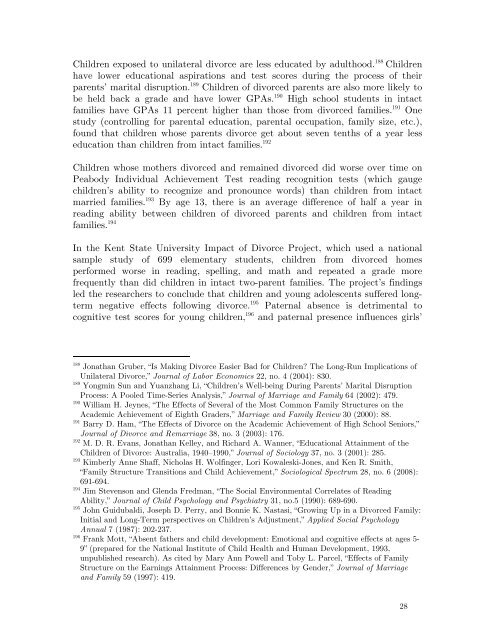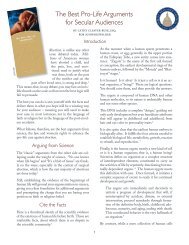The Effects of Divorce on Children - Family Research Council
The Effects of Divorce on Children - Family Research Council
The Effects of Divorce on Children - Family Research Council
Create successful ePaper yourself
Turn your PDF publications into a flip-book with our unique Google optimized e-Paper software.
<strong>Children</strong> exposed to unilateral divorce are less educated by adulthood. 188 <strong>Children</strong><br />
have lower educati<strong>on</strong>al aspirati<strong>on</strong>s and test scores during the process <str<strong>on</strong>g>of</str<strong>on</strong>g> their<br />
parents’ marital disrupti<strong>on</strong>. 189 <strong>Children</strong> <str<strong>on</strong>g>of</str<strong>on</strong>g> divorced parents are also more likely to<br />
be held back a grade and have lower GPAs. 190 High school students in intact<br />
families have GPAs 11 percent higher than those from divorced families. 191 One<br />
study (c<strong>on</strong>trolling for parental educati<strong>on</strong>, parental occupati<strong>on</strong>, family size, etc.),<br />
found that children whose parents divorce get about seven tenths <str<strong>on</strong>g>of</str<strong>on</strong>g> a year less<br />
educati<strong>on</strong> than children from intact families. 192<br />
<strong>Children</strong> whose mothers divorced and remained divorced did worse over time <strong>on</strong><br />
Peabody Individual Achievement Test reading recogniti<strong>on</strong> tests (which gauge<br />
children’s ability to recognize and pr<strong>on</strong>ounce words) than children from intact<br />
married families. 193 By age 13, there is an average difference <str<strong>on</strong>g>of</str<strong>on</strong>g> half a year in<br />
reading ability between children <str<strong>on</strong>g>of</str<strong>on</strong>g> divorced parents and children from intact<br />
families. 194<br />
In the Kent State University Impact <str<strong>on</strong>g>of</str<strong>on</strong>g> <str<strong>on</strong>g>Divorce</str<strong>on</strong>g> Project, which used a nati<strong>on</strong>al<br />
sample study <str<strong>on</strong>g>of</str<strong>on</strong>g> 699 elementary students, children from divorced homes<br />
performed worse in reading, spelling, and math and repeated a grade more<br />
frequently than did children in intact two-parent families. <str<strong>on</strong>g>The</str<strong>on</strong>g> project’s findings<br />
led the researchers to c<strong>on</strong>clude that children and young adolescents suffered l<strong>on</strong>gterm<br />
negative effects following divorce. 195 Paternal absence is detrimental to<br />
cognitive test scores for young children, 196 and paternal presence influences girls’<br />
188 J<strong>on</strong>athan Gruber, “Is Making <str<strong>on</strong>g>Divorce</str<strong>on</strong>g> Easier Bad for <strong>Children</strong>? <str<strong>on</strong>g>The</str<strong>on</strong>g> L<strong>on</strong>g-Run Implicati<strong>on</strong>s <str<strong>on</strong>g>of</str<strong>on</strong>g><br />
Unilateral <str<strong>on</strong>g>Divorce</str<strong>on</strong>g>,” Journal <str<strong>on</strong>g>of</str<strong>on</strong>g> Labor Ec<strong>on</strong>omics 22, no. 4 (2004): 830.<br />
189 Y<strong>on</strong>gmin Sun and Yuanzhang Li, “<strong>Children</strong>’s Well-being During Parents’ Marital Disrupti<strong>on</strong><br />
Process: A Pooled Time-Series Analysis,” Journal <str<strong>on</strong>g>of</str<strong>on</strong>g> Marriage and <strong>Family</strong> 64 (2002): 479.<br />
190 William H. Jeynes, “<str<strong>on</strong>g>The</str<strong>on</strong>g> <str<strong>on</strong>g>Effects</str<strong>on</strong>g> <str<strong>on</strong>g>of</str<strong>on</strong>g> Several <str<strong>on</strong>g>of</str<strong>on</strong>g> the Most Comm<strong>on</strong> <strong>Family</strong> Structures <strong>on</strong> the<br />
Academic Achievement <str<strong>on</strong>g>of</str<strong>on</strong>g> Eighth Graders,” Marriage and <strong>Family</strong> Review 30 (2000): 88.<br />
191 Barry D. Ham, “<str<strong>on</strong>g>The</str<strong>on</strong>g> <str<strong>on</strong>g>Effects</str<strong>on</strong>g> <str<strong>on</strong>g>of</str<strong>on</strong>g> <str<strong>on</strong>g>Divorce</str<strong>on</strong>g> <strong>on</strong> the Academic Achievement <str<strong>on</strong>g>of</str<strong>on</strong>g> High School Seniors,”<br />
Journal <str<strong>on</strong>g>of</str<strong>on</strong>g> <str<strong>on</strong>g>Divorce</str<strong>on</strong>g> and Remarriage 38, no. 3 (2003): 176.<br />
192 M. D. R. Evans, J<strong>on</strong>athan Kelley, and Richard A. Wanner, “Educati<strong>on</strong>al Attainment <str<strong>on</strong>g>of</str<strong>on</strong>g> the<br />
<strong>Children</strong> <str<strong>on</strong>g>of</str<strong>on</strong>g> <str<strong>on</strong>g>Divorce</str<strong>on</strong>g>: Australia, 1940–1990,” Journal <str<strong>on</strong>g>of</str<strong>on</strong>g> Sociology 37, no. 3 (2001): 285.<br />
193 Kimberly Anne Shaff, Nicholas H. Wolfinger, Lori Kowaleski-J<strong>on</strong>es, and Ken R. Smith,<br />
“<strong>Family</strong> Structure Transiti<strong>on</strong>s and Child Achievement,” Sociological Spectrum 28, no. 6 (2008):<br />
691-694.<br />
194 Jim Stevens<strong>on</strong> and Glenda Fredman, “<str<strong>on</strong>g>The</str<strong>on</strong>g> Social Envir<strong>on</strong>mental Correlates <str<strong>on</strong>g>of</str<strong>on</strong>g> Reading<br />
Ability,” Journal <str<strong>on</strong>g>of</str<strong>on</strong>g> Child Psychology and Psychiatry 31, no.5 (1990): 689-690.<br />
195 John Guidubaldi, Joseph D. Perry, and B<strong>on</strong>nie K. Nastasi, “Growing Up in a <str<strong>on</strong>g>Divorce</str<strong>on</strong>g>d <strong>Family</strong>:<br />
Initial and L<strong>on</strong>g-Term perspectives <strong>on</strong> <strong>Children</strong>’s Adjustment,” Applied Social Psychology<br />
Annual 7 (1987): 202-237.<br />
196 Frank Mott, “Absent fathers and child development: Emoti<strong>on</strong>al and cognitive effects at ages 5-<br />
9” (prepared for the Nati<strong>on</strong>al Institute <str<strong>on</strong>g>of</str<strong>on</strong>g> Child Health and Human Development, 1993,<br />
unpublished research). As cited by Mary Ann Powell and Toby L. Parcel, “<str<strong>on</strong>g>Effects</str<strong>on</strong>g> <str<strong>on</strong>g>of</str<strong>on</strong>g> <strong>Family</strong><br />
Structure <strong>on</strong> the Earnings Attainment Process: Differences by Gender,” Journal <str<strong>on</strong>g>of</str<strong>on</strong>g> Marriage<br />
and <strong>Family</strong> 59 (1997): 419.<br />
28




